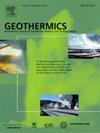Modelling the U-pipe heat exchanger to estimate the borehole thermal resistances from distributed thermal response test data
IF 3.9
2区 工程技术
Q3 ENERGY & FUELS
引用次数: 0
Abstract
The correct estimation of the parameters used by the design methods of the borehole heat exchangers (BHEs) is critical to achieve the desired performance of ground-source heat pumps (GSHPs). The present study provides methods for estimating these parameters from a distributed thermal response test (DTRT) for single and double U-tube BHEs. The focus is on the total internal borehole thermal resistance Ra, which is often overlooked by conventional analysis methods. Still, Ra becomes increasingly important as the borehole length increases. Parameter estimates have been obtained with the related uncertainties from a DTRT by using analytical models applied to both a measured data set and numerically simulated DTRT data sets. Results indicate that a uniform borehole-wall heat flux model outperforms a uniform borehole-wall temperature model in estimating the borehole and ground thermal properties. In addition, results demonstrate that using the transient inlet, outlet and bottom fluid temperatures instead of the complete vertical temperature profile in a DTRT is sufficient to give an accurate estimate of the borehole and ground properties, suggesting a more cost-effective measurement approach.
对u型管换热器进行建模,利用分布式热响应测试数据估计井眼热阻
井内换热器设计方法中参数的正确估计对地源热泵性能的实现至关重要。本研究提供了从单u管和双u管BHEs的分布式热响应测试(DTRT)中估计这些参数的方法。重点关注井内总热阻Ra,这是常规分析方法经常忽略的。然而,随着井眼长度的增加,Ra变得越来越重要。通过应用于实测数据集和数值模拟DTRT数据集的分析模型,获得了带有DTRT相关不确定性的参数估计。结果表明,均匀井壁热流密度模型比均匀井壁温度模型在估算井眼和地面热特性方面效果更好。此外,研究结果表明,在DTRT中,使用瞬态进口、出口和底部流体温度而不是完整的垂直温度分布,足以准确估计井眼和地面特性,这是一种更具成本效益的测量方法。
本文章由计算机程序翻译,如有差异,请以英文原文为准。
求助全文
约1分钟内获得全文
求助全文
来源期刊

Geothermics
工程技术-地球科学综合
CiteScore
7.70
自引率
15.40%
发文量
237
审稿时长
4.5 months
期刊介绍:
Geothermics is an international journal devoted to the research and development of geothermal energy. The International Board of Editors of Geothermics, which comprises specialists in the various aspects of geothermal resources, exploration and development, guarantees the balanced, comprehensive view of scientific and technological developments in this promising energy field.
It promulgates the state of the art and science of geothermal energy, its exploration and exploitation through a regular exchange of information from all parts of the world. The journal publishes articles dealing with the theory, exploration techniques and all aspects of the utilization of geothermal resources. Geothermics serves as the scientific house, or exchange medium, through which the growing community of geothermal specialists can provide and receive information.
 求助内容:
求助内容: 应助结果提醒方式:
应助结果提醒方式:


